Recent Articles
Popular Makes
Body Types
2021 Lincoln Nautilus vs. 2021 Lexus RX 350
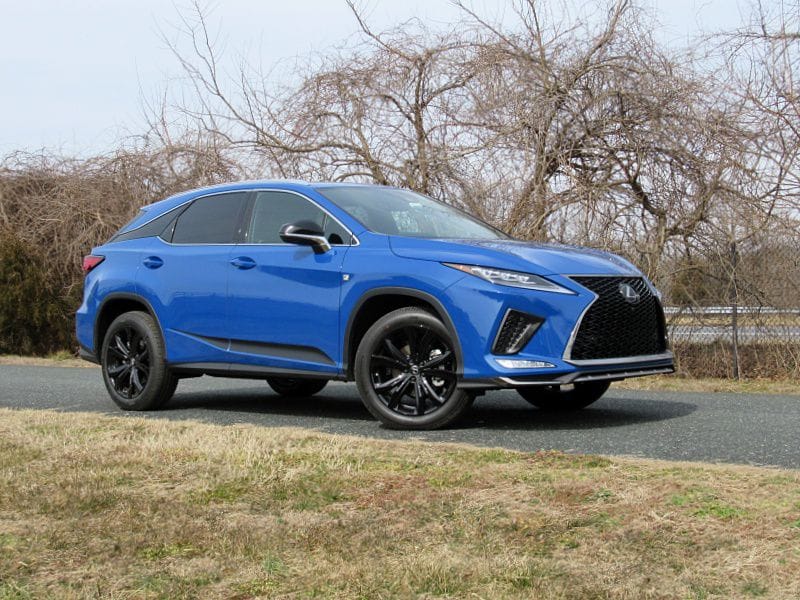
2021 Lexus RX 350 ・ Photo by Brady Holt
The Lexus RX is America’s best-selling luxury vehicle. This mid-size crossover helped invent its segment back in 1999, and ever since, it has won loyal fans for its quiet ride, easy handling, and reputation for reliability. The latest generation also brings wildly extroverted styling.
But one of the RX’s closest competitors recently got a comprehensive update, and it’s worth paying attention to. That’s the Lincoln Nautilus, a fellow five-passenger mid-size luxury SUV. Lincoln ripped out the crossover’s anonymous old dashboard and put in a jaw-dropper with top-notch design and infotainment. To write this review, we spent a week in each crossover so that we could compare them across eight categories and then name an overall winner. Keep reading to learn which one we picked and which mid-size luxury crossover is better for you.
Pricing and Features
The 2022 Lincoln Nautilus starts at $42,500, which comfortably undercuts the 2021 Lexus RX 350’s base price of $45,220. That’s despite some additional standard equipment, including a jumbo infotainment screen with a navigation system, memory settings for the power driver’s seat, and heated front seats.
The RX does provide a V6 engine on every model, while Lincoln charges extra if you want six cylinders instead of four. Lexus also includes adaptive cruise control as standard equipment instead of part of a costly collection of options. Several other features, such as ventilated front seats, are also more affordable on the RX 350 than the Nautilus. And if you’re not careful with options, you end up with our Nautilus test vehicle’s dizzying $77,900 sticker price. Still, the Lincoln generally has more features for the money than the Lexus.
Lincoln Nautilus

Photo by Brady Holt
Exterior Design
The current-generation RX debuted as a 2016 model, but it’s still polarizing and fresh. Its swoopy hatchback-like shape was ahead of the “SUV coupe” curve, and the front end features Lexus’s big hourglass-shaped “spindle” grille that drops down from two high, slim headlights. For a slightly more conservative look, the extended-length RX 350L model has a bigger and boxier rear end.
The Nautilus is a more conventional design. It’s gently rounded and sprinkled with chrome trim. The front end looks purposeful, with high headlights and an upright grille — the latest Lincoln signature face — but it’s not aggressive. To us, it’s soft but not saggy, restrained but not dull, communicating an aura of comfort and quiet. You’ll choose for yourself whether you prefer calm or drama for your crossover’s exterior.
Tie
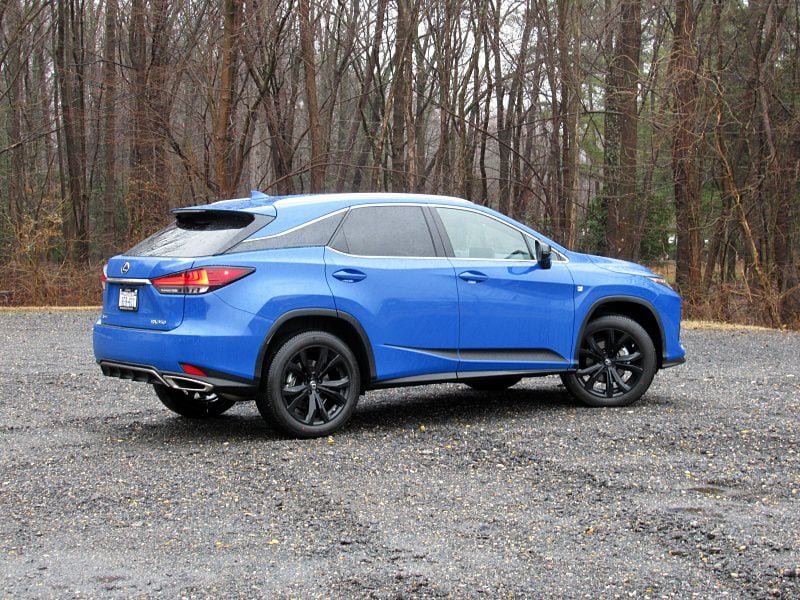
Photo by Brady Holt
Interior Design
Until last year, the Nautilus had an anonymous dashboard that would have looked right at home in the Ford Edge, the vehicle’s mechanical cousin. The new design is borrowed from other Lincoln models. The horizontal, rectangular-themed dashboard recalls American cars of the 1980s — only with far better materials and smoothly integrated technology. The centerpiece is a huge 13.2-inch infotainment touchscreen, replacing last year’s modest 8-inch unit. It’s standard equipment on every Nautilus, and its big fonts and muted graphics make it both elegant and easy to use. Lincoln used the big screen to make things easier to see, so technophobes needn’t fear.
Lexus also recently upgraded the RX’s control layout. It moved the crossover’s infotainment screen closer to the driver and added touchscreen capability, so you don’t have to go through a clunky touchpad interface. It’s a welcome upgrade, but the experience still trails the Nautilus. The screens are smaller (8 inches standard, 12.3 inches available), there are more humdrum-feeling materials, the cabin’s shrill warning beeps are anything but relaxing luxury, and the controls are still more complex than the Lincoln’s. The RX’s asymmetrical dash looks a bit sportier, but the Nautilus otherwise dominates this category.
Lincoln Nautilus
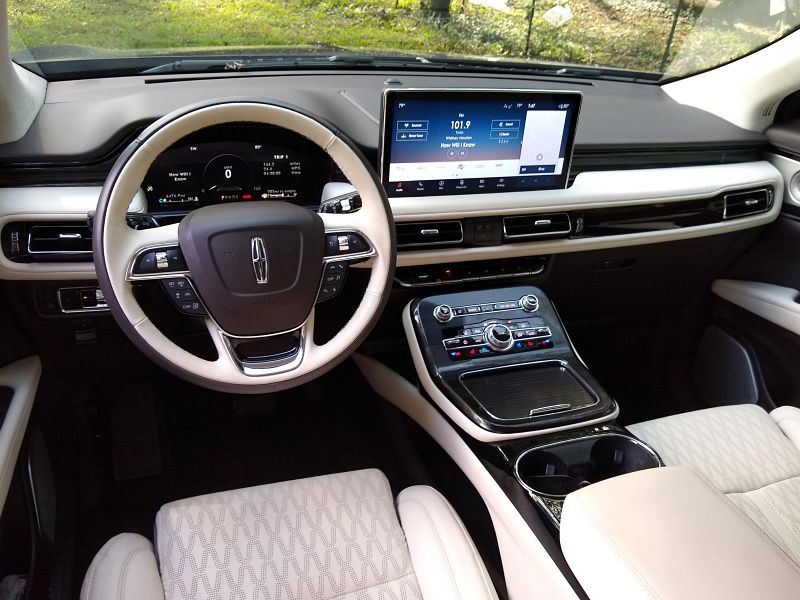
Photo by Brady Holt
Interior Comfort
Every Nautilus has cushy seats and ample space to spread out in the front and rear. You can even upgrade to Lincoln’s “Ultra Comfort” seats, which offer 22-way adjustments and a massage feature. These seats let you independently move different parts of the seatback and cushion, then locking in your preference in the SUV’s memory system. It took us a while to get things just right, but if you’re not thrilled with the standard Nautilus seats, it can be worth the bother and expense. The Ultra Comfort seats are a $1,500 option on all but the base Nautilus trim level.
The RX 350 is comfortable, too, whether you’re sitting in the front or the back. We prefer the F Sport model’s more heavily bolstered front seats, but individual tastes will vary. However, if you opt for the RX 350L, you get a tiny third-row seat that’s barely usable and also robs second-row seat space. Either way, though, we still pick the extra-cosseting Lincoln.
Lincoln Nautilus
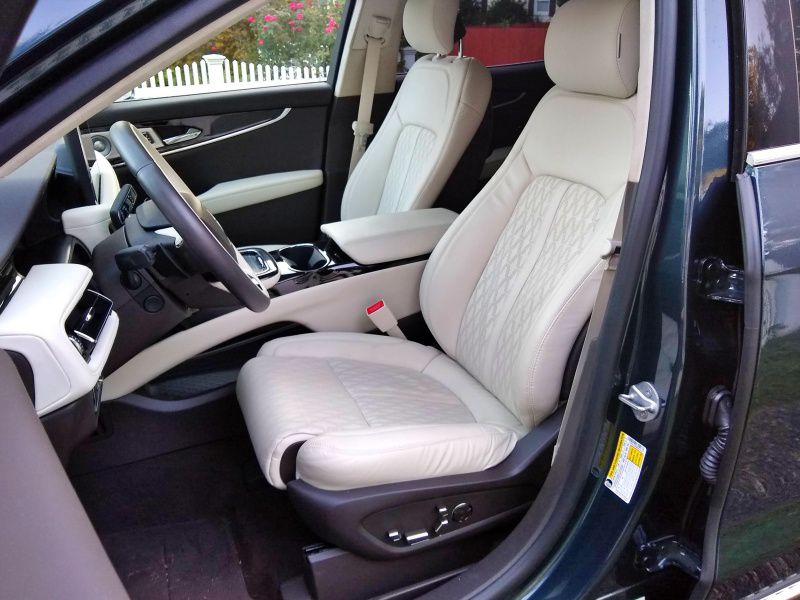
Photo by Brady Holt
Cargo and Utility
The RX 350’s sporty styling cramps its cargo-hauling ability. Between the sloping roof and a high cargo floor, the standard-length RX fits just 18 cubic feet of cargo behind its rear seat. That’s less than many subcompact crossovers and less than half the Nautilus’s 37-cubic-foot capacity. With the rear seat folded, the Lexus’s cargo capacity increases to 56 cubic feet; the Lincoln’s hits 69 cubic feet.
The RX 350L offers a bit more space than the standard model: 22 cubic feet behind its second row and 59 cubic feet behind its front seat. (You only get 8 cubic feet behind the tiny third row.) But the Nautilus handily beats it here, too. And while some cargo specifications defy real-world logic, you’ll definitely feel the pinch in at least the two-row RX. Both of these crossovers are rated to tow up to 3,500 pounds.
Lincoln Nautilus
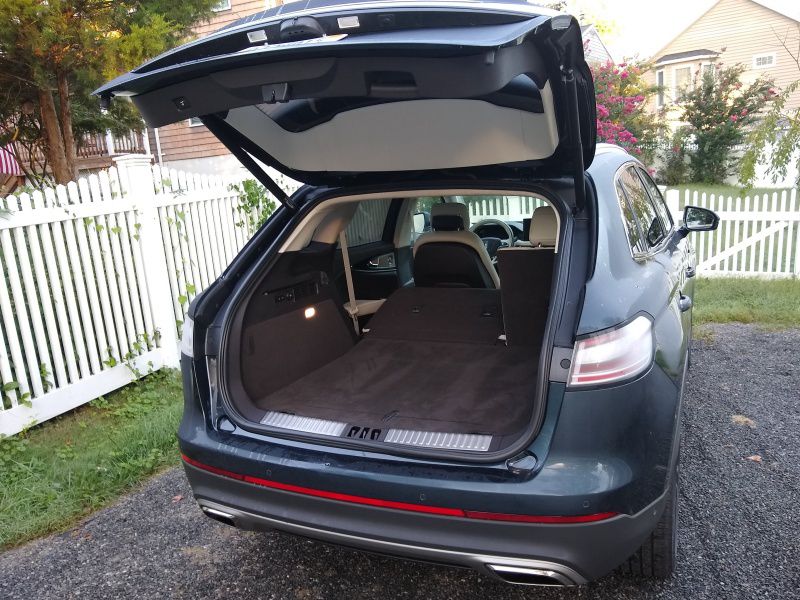
Photo by Brady Holt
Driving Impressions
The RX’s aggressive styling and available F Sport model suggest this is a driver’s SUV — something invigorating. And Lexus’s reputation promises the opposite: something hushed and comfort-focused. The RX didn’t blow us away on either count. It’s smooth and quiet, sure, but nothing incredible for a luxury car. And while it’s more agile than past RX generations, even the F Sport isn’t a superstar.
The Nautilus is not only more serene than the RX, but it’s also no less agile. Our test vehicle’s big 21-inch wheels can crash too harshly over bumps, but we have no complaints with the exquisitely silenced cabin. You can also get the Nautilus with more power than the RX: an optional 335-horsepower turbocharged V6, rather than the Lincoln’s standard 250-horsepower turbocharged four-cylinder. Every RX 350 has a 295-horsepower V6 engine, which provides a richer sound than the four-cylinder Nautilus but isn’t any quicker. Unless you’re wedded to a V6 — which is a potent but costly add-on in the Lincoln — we pick the Nautilus.
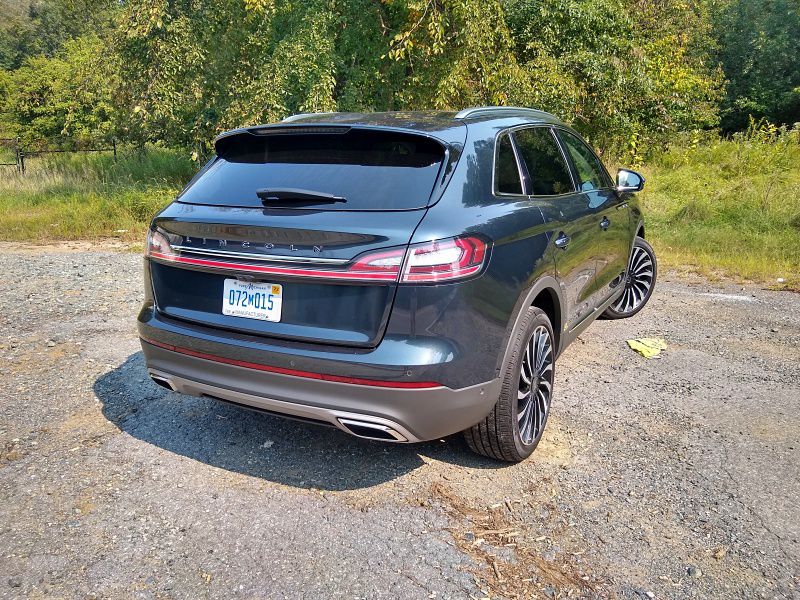
Photo by Brady Holt
Fuel Economy
Despite the Lexus’s extra cylinders, the RX 350 gets the same EPA fuel economy estimates as the four-cylinder Nautilus: 23 mpg in mixed driving with front-wheel drive and 22 mpg with all-wheel drive. The V6 Lincoln, sold only with AWD, achieves an estimated 21 mpg in mixed driving. We did average 23 mpg in our V6 Nautilus versus just 20 mpg in our AWD RX 350; we don’t conduct scientifically precise testing, but that difference did surprise us.
Lexus does have another trick up its sleeve, though: If you opt for the RX 450h model, you add electric motors to the RX 350’s gasoline V6 engine. That means you get the same smooth, strong performance along with exceptional gas mileage in stop-and-go conditions or at low speeds. The EPA pegs it at 31 mpg city, 28 mpg highway, and 30 mpg combined. Opting for the RX L model cuts each RX variant’s mileage by about 1 mpg, and we met that EPA estimate to average 29 mpg in an RX 450hL.
Lexus RX
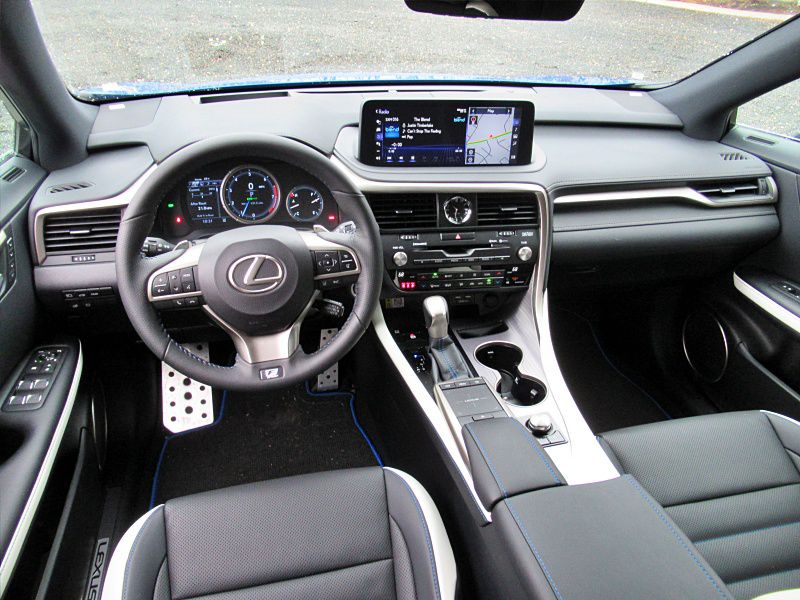
Photo by Brady Holt
Safety
Both the Nautilus and RX come with a long list of standard safety features and earned excellent crash-test scores from the Insurance Institute for Highway Safety. Whichever SUV you choose, you’ll get automatic emergency braking, lane-keeping steering assistance, and blind-spot monitoring with a rear cross-traffic alert, and both are available with handy surround-view parking cameras. And in IIHS testing, the only difference is that some Nautilus models have better headlight illumination than some RXs, and vice versa.
The difference comes in separate crash tests conducted by the National Highway Traffic Safety Administration. Like most new cars, the Nautilus earned a top five-star NHTSA rating. But the RX earns just four stars, knocked down by a disappointing three-star score for driver protection in a frontal impact.
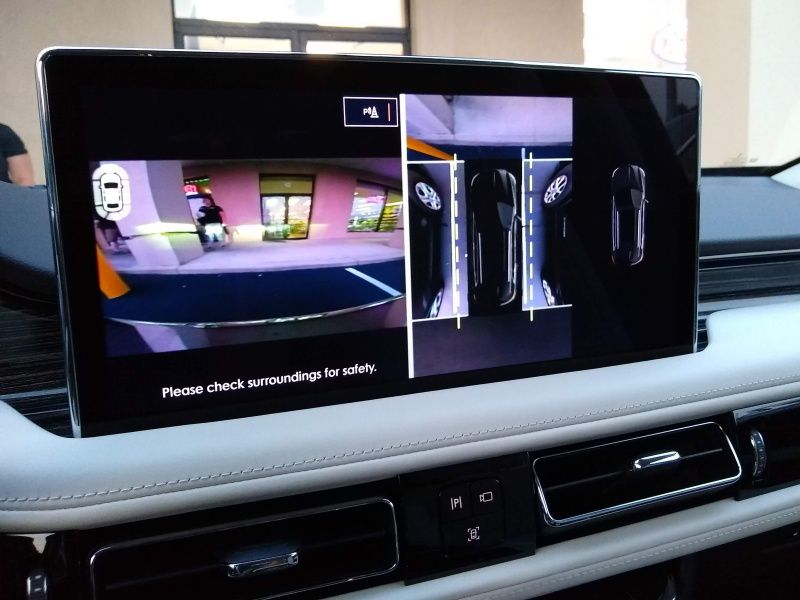
Photo by Brady Holt
Final Thoughts
Despite the RX’s popularity, it’s the Nautilus that truly impresses us. Whether you’re interested in comfort, performance, functionality, technology, value, or safety, the Lincoln comes out on top. The Nautilus is all about a relaxing, stress-free experience, and you find that in everything from its subtle styling to its quiet ride to its extra-easy controls.
We haven’t mentioned reliability, a key selling point for many Lexus vehicles. Many RX buyers keep coming back because their previous model served them well. But there’s limited data about the Nautilus to confirm how it will fare over time — whether it will be better or worse than the Lexus. If peace of mind is paramount, the RX is a comfortable and high-style way to stick with a known quantity. But otherwise, this is a one-sided competition that Lincoln wins in a landslide.
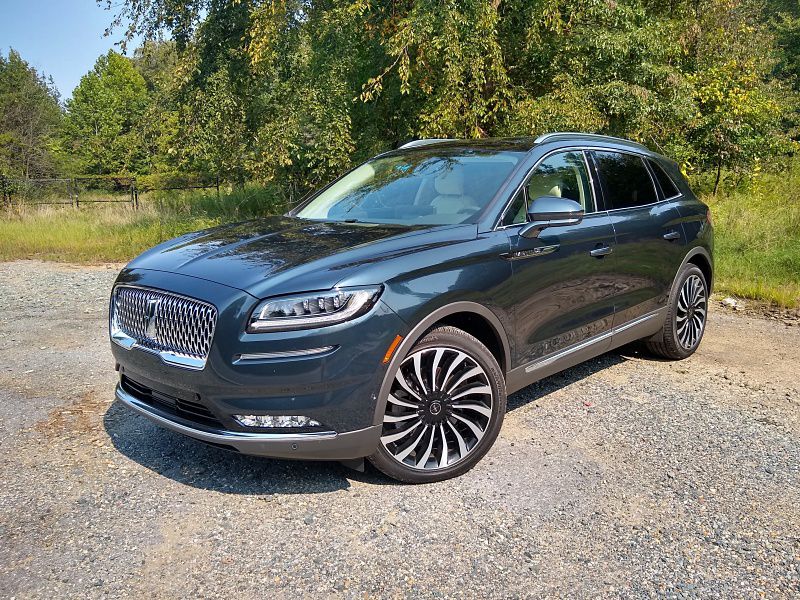
Photo by Brady Holt